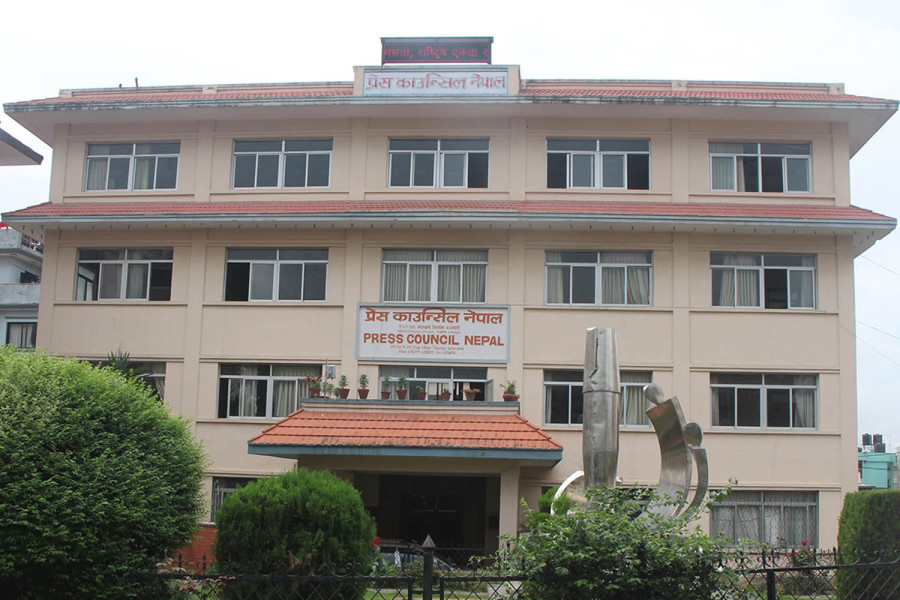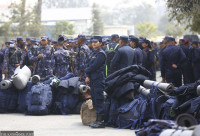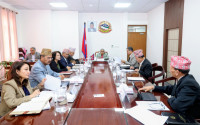National
Press Council Nepal appeals to media platforms to make social media reliable
Experts say while the agency’s intentions may be good, it infringes on citizens’ freedom of expression.
Post Report
The Press Council Nepal has urged caution on the use of social media platforms, including YouTube channels, Facebook pages, and affiliated media accounts, appealing to users to adhere to factual and reliable reporting standards, citing rising misinformation on these platforms.
Released on Tuesday, the council’s appeal stresses the need for transparency by requiring administrators’ names and addresses on social media sites.
Chairman Balkrishna Basnet says, properly utilised, social media can enhance public discourse and civic engagement, providing users with credible and valuable information.
However, as per Basnet the potential can only be realised if social media administrators commit to ethical standards and factual reporting.
According to Ramsharan Bohara, the council’s deputy spokesperson and information officer, this appeal is part of a broader initiative to monitor social media content.
The step includes tracking objectionable or harmful materials, conducting trend analysis, implementing corrective actions, and raising public awareness on digital misinformation.
To systematically address the spread of misinformation, Bohara said that the council has implemented a three-tiered monitoring approach for social media.
The first category comprises social media accounts directly affiliated with established mainstream media outlets, such as the Facebook page of Kantipur. For these accounts, the council performs routine checks to ensure adherence to ethical standards.
The second category targets social media pages that resemble media outlets in structure and content but operate without formal registration.
“These pages are of particular concern, as they distribute information akin to news while evading accountability,” says Bohara.
In cases where these platforms are found to spread biassed or false information, the Council will forward the cases to the relevant law enforcement agencies for appropriate action.
The third category includes individual social media users. Here, the council’s intervention is more limited, applying only when it receives complaints of misinformation.
If individual pages are found to be spreading harmful content without any media affiliation, the council will opt for counselling to inform the individual on the repercussions of misinformation.
In cases where social media pages linked to media organisations or unregistered platforms spread rumours, incite conflicts, or share content deemed inappropriate or harmful, Bohara clarified that the Council would refer these matters to the Cyber Bureau of the Nepal Police for further investigation and potential legal action.
But experts like advocate Santosh Sigdel have serious concerns over the council’s decision.
Sigdel, who is the executive director of Digital Rights Nepal, says the Press Council Nepal’s decision to monitor social media, is problematic and an infringement on the right to freedom of expression guaranteed by the constitution.
According to Sigdel, the council lacks the authority to regulate social media under the prevailing laws. Sigdel says, “The Press Council’s mandate is limited to regulating registered media outlets and does not extend to monitoring social media platforms or pages that may not qualify as media.”
The Council’s announcement comes amidst a growing problem in Nepal’s digital landscape.
According to the ‘Nepal Social Media Users Survey’ conducted in 2021 by the Center for Media Research Nepal, a staggering 92 percent of social media users in Nepal reported encountering misinformation online.
Facebook topped the list, with 79.8 percent of respondents stating they had encountered misinformation on the platform, followed by YouTube (48.1 percent), Twitter (36.3 percent), and websites (30.3 percent).
However, some new trends can be seen these days. In an article published in the Post in August, most common platforms for online fraud in Nepal were named Telegram and WhatsApp.
Such high exposure rates of misinformation illustrate the urgent need for responsible management of online information.
Further concern arises over the misuse of social media platforms to spread unverified information, inflame public emotions, or discredit registered and traditional mainstream media.
The Council has observed an increasing trend in these activities, which has led to public confusion and erosion of trust in verified media.
Bohara says the regulatory efforts aim to address these issues by establishing standards for reliability and transparency across both registered and non-registered platforms.
Former deputy inspector general of Nepal Police and IT expert Rajib Subba suggests that a practical monitoring approach must balance freedom of expression with the need for accountability.
“Monitoring social media in its entirety is neither technically feasible nor constitutionally reasonable,” Subba said. He emphasised that any monitoring should focus on media-linked accounts rather than attempting to cover every social media user.
According to him, social media platforms could reduce the need for oversight by ensuring compliance through responsible platform management.
He urged the government to encourage accountability among social media platforms operating in Nepal, suggesting that registered platforms should be consulted on compliance standards while unregistered entities should be prompted to register.
Subba says that any Facebook or YouTube channel operating for commercial or institutional purposes must include proper official information on its website, such as accurate contact details and addresses.
Individual social media accounts might not require the same level of formality, but those with institutional or commercial intentions should be registered and adhere to an official code of conduct.
Reflecting on the situation in the aftermath of the 2015 earthquakes, Subba recalled the widespread misinformation that circulated at the time.
During an investigation, his team identified an online newspaper as one of the sources. However, when they reached out to the listed editor, they were told, “You have contacted the wrong person; I am not related to any media.”
“This lack of correct contact information given on the online sites or Facebook pages hampered our efforts to trace misinformation sources,” said Subba.
According to Subba, pages acting as media or sharing information should have official administrative addresses and emails, with such information recorded by the Press Council Nepal.
Bohara says that since mid-April 2024, the Council has been actively working on the plans of monitoring processes, but full compliance with the constitutional and legal framework for press freedom remains the council’s top priority.
“While the council’s intentions may be good, its overt approach beyond its jurisdiction raises significant concerns about the negative impact on privacy and free expression,” said Sigdel.
Instead, Sigdel suggests that misinformation could be managed under the existing legal instruments including the ‘Electronic Transactions Act, 2006’, or through new, thoughtfully made interventions.




 8.4°C Kathmandu
8.4°C Kathmandu













